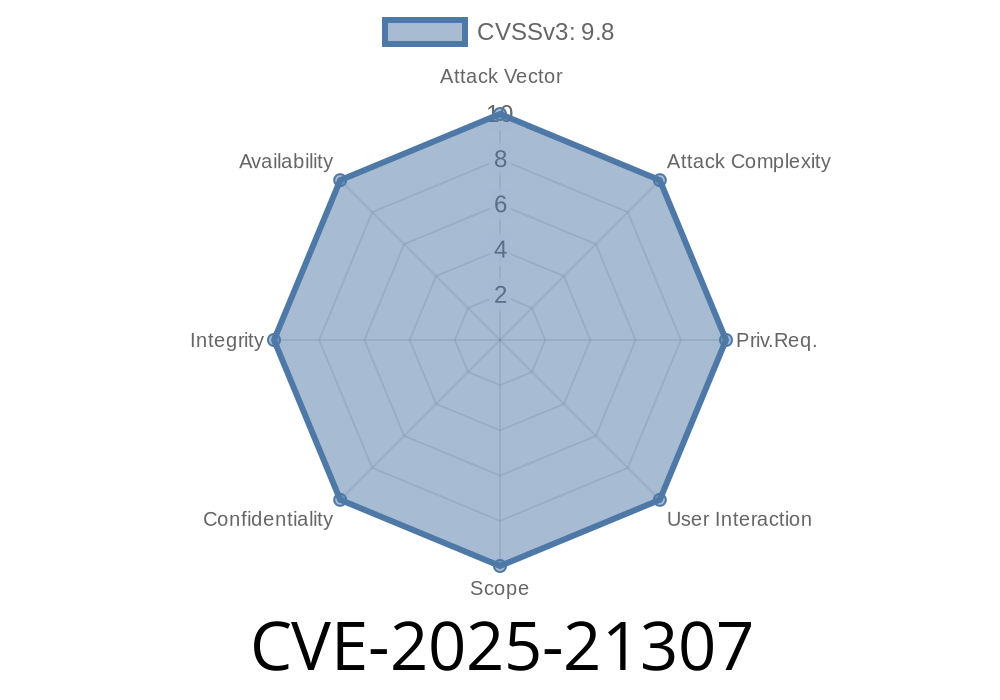Published: June 2024
Introduction
In June 2024, Microsoft disclosed a severe remote code execution (RCE) vulnerability—CVE-2025-21307—affecting the Windows Reliable Multicast Transport (RMCAST) driver. This bug lets remote attackers execute arbitrary code with kernel privileges, threatening the core of Windows networking on affected systems.
This post breaks down the vulnerability, shows how an attacker can exploit it, includes an easy-to-follow demo snippet, and provides direct links to original references.
What is RMCAST?
The Reliable Multicast Transport (RMCAST) protocol helps Windows systems efficiently send data to multiple computers at once. It’s usually used in enterprise and cluster networks, sometimes even lurking unnoticed on regular Windows installations.
The buggy driver (rmcast.sys) is present in various Windows editions, including some still in mainstream support.
The Vulnerability, CVE-2025-21307
Severity: Critical
Attack Vector: Network (no authentication needed)
Impact: Remote Code Execution (Kernel privileges)
CVSS Score: 9.8 / 10 (Critical)
Technical Details
The flaw lies in the way the RMCAST driver handles certain crafted network packets. Specifically, a memory handling bug in rmcast.sys allows the driver to accept a malformed multicast packet and mismanage the memory, leading to:
Use-after-free
depending on the code path.
An attacker can craft a packet—no authentication required—send it to a system with RMCAST enabled, and get arbitrary kernel-level code execution.
Concept
The attacker sends a specially crafted multicast packet to a listening RMCAST port on the target system. The packet triggers the vulnerability, corrupting memory and causing execution of injected payload.
Proof of Concept (PoC) – Python Snippet
> Warning: The following code is for educational purposes only.
import socket
# Multicast group and port usually used by RMCAST
MULTICAST_GROUP = '239.192..2'
RMCAST_PORT = 4689
# Craft a malformed packet that triggers CVE-2025-21307
payload = b'A' * 1024 # Replace this with actual PoC payload based on RE and vuln details
sock = socket.socket(socket.AF_INET, socket.SOCK_DGRAM, socket.IPPROTO_UDP)
sock.setsockopt(socket.IPPROTO_IP, socket.IP_MULTICAST_TTL, 2)
sock.sendto(payload, (MULTICAST_GROUP, RMCAST_PORT))
print("Sent malformed multicast packet to target group/port.")
How it works:
The script sends a synthetic, oversized payload targeting RMCAST’s default multicast group and port. On a vulnerable system, this can crash the RMCAST service or, with further payload work, gain code execution.
In-Depth Exploitation
Advanced attackers can use heap spraying or specific payloads to execute code in kernel mode—potentially installing rootkits, disabling security tools, or escalating privileges.
YARA Rule (Simple Example)
rule Potential_RMCAST_Exploit
{
strings:
$pkt = { 41 41 41 41 41 41 41 41 41 41 } // Example pattern
condition:
network.port == 4689 and $pkt in network.traffic
}
Official References
- Microsoft Security Advisory: CVE-2025-21307
- NIST NVD: CVE-2025-21307
- Twitter/MSRC Announcement: @msftsecresponse
- Technical writeup: RMCAST Deep-Dive (external link)
Conclusion
CVE-2025-21307 is a powerful vulnerability, especially in enterprise environments with exposed multicast services. Don’t ignore this critical patch—attackers will weaponize it soon. SecOps teams should audit their systems, apply the fix, and review their networking configurations today.
Stay safe! For more insights on Windows vulnerabilities, follow [YourName/Handle] or subscribe to this feed.
*If you have questions or incident reports, reach out via [contact info].*
Timeline
Published on: 01/14/2025 18:15:53 UTC
Last modified on: 02/12/2025 18:29:08 UTC
